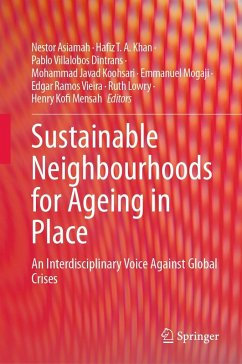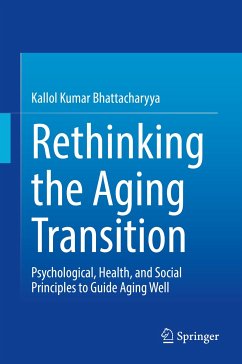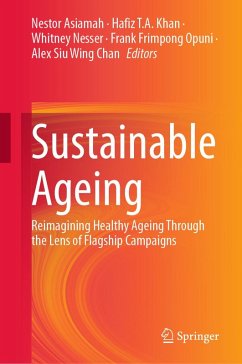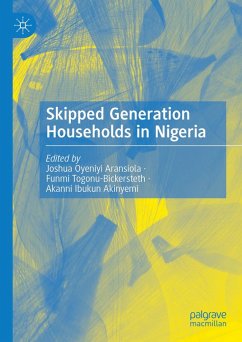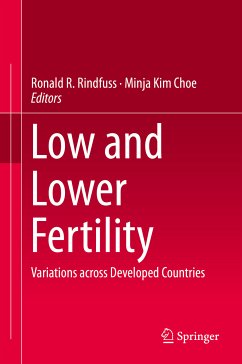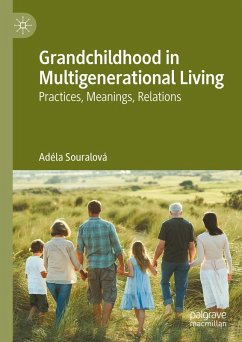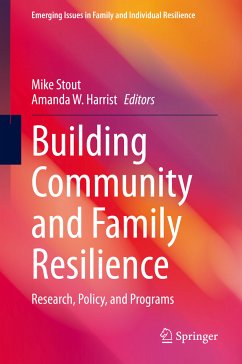
Age-Friendly Ecosystems (eBook, PDF)
Environments for Equitable Aging by Design
Redaktion: Chang Greer, Valerie; Edelman, Linda S.
Versandkostenfrei!
Sofort per Download lieferbar
36,95 €
inkl. MwSt.
Weitere Ausgaben:

PAYBACK Punkte
18 °P sammeln!
This compact book examines age friendliness within the framework of age-friendly ecosystems, and from a place-based approach, considering anchor institutions of neighborhoods, campuses and health environments as sites uniquely positioned to catalyze age equity and inclusivity.Age friendliness has grown from an idea into a social movement that recognizes the diversity of older adults, and integrates research, policy, programming and design practices. Compounding pressures of rapid aging, systemic ageism, and a growing disparity of resources compel us to rethink how we achieve equity in aging th...
This compact book examines age friendliness within the framework of age-friendly ecosystems, and from a place-based approach, considering anchor institutions of neighborhoods, campuses and health environments as sites uniquely positioned to catalyze age equity and inclusivity.
Age friendliness has grown from an idea into a social movement that recognizes the diversity of older adults, and integrates research, policy, programming and design practices. Compounding pressures of rapid aging, systemic ageism, and a growing disparity of resources compel us to rethink how we achieve equity in aging through the design of places and practices.
Content for this book draws from a 2022 symposium, Age Friendly Communities as Platforms for Equity, Health & Wellness. Contributors build upon the content shared through the symposium in order to examine how neighborhoods, campuses and health environments are uniquely poised to support equity and to extend reach to historically marginalized populations of older adults. Ideas and experiences from national experts in aging, as well as "real world" experiences and narratives shared by older adults, students, community stakeholders and faculty researchers, are presented through a place-based approach. Collectively the voices in this book create a lens for empowering age-friendly ecosystems as environments for equitable aging by design. Among the topics covered:
Age-Friendly Ecosystems: Environments for Equitable Aging by Design is written for people who are interested in understanding how the age-friendly movement is transforming places we live - community planners, designers, policy makers, aging service providers, academics and citizen activists. This compact volume presents a case of need for age friendliness in places we live, learn and care for our health. Readers with interests in the professional practice areas of aging studies/gerontology, architecture and planning, colleges and universities, community/neighborhood development, health systems, research, and policy will benefit from this brief that examines neighborhoods, campuses, and health environments from interdisciplinary perspectives.
Age friendliness has grown from an idea into a social movement that recognizes the diversity of older adults, and integrates research, policy, programming and design practices. Compounding pressures of rapid aging, systemic ageism, and a growing disparity of resources compel us to rethink how we achieve equity in aging through the design of places and practices.
Content for this book draws from a 2022 symposium, Age Friendly Communities as Platforms for Equity, Health & Wellness. Contributors build upon the content shared through the symposium in order to examine how neighborhoods, campuses and health environments are uniquely poised to support equity and to extend reach to historically marginalized populations of older adults. Ideas and experiences from national experts in aging, as well as "real world" experiences and narratives shared by older adults, students, community stakeholders and faculty researchers, are presented through a place-based approach. Collectively the voices in this book create a lens for empowering age-friendly ecosystems as environments for equitable aging by design. Among the topics covered:
- Creating an Age-Friendly Environment Across the Ecosystem
- Age Friendliness as a Framework for Equity in Aging
- Age-Friendly Voices in the Pursuit of an Age-Friendly Ecosystem
- Age-Friendly Futures: Equity by Design
Age-Friendly Ecosystems: Environments for Equitable Aging by Design is written for people who are interested in understanding how the age-friendly movement is transforming places we live - community planners, designers, policy makers, aging service providers, academics and citizen activists. This compact volume presents a case of need for age friendliness in places we live, learn and care for our health. Readers with interests in the professional practice areas of aging studies/gerontology, architecture and planning, colleges and universities, community/neighborhood development, health systems, research, and policy will benefit from this brief that examines neighborhoods, campuses, and health environments from interdisciplinary perspectives.
Dieser Download kann aus rechtlichen Gründen nur mit Rechnungsadresse in A, B, BG, CY, CZ, D, DK, EW, E, FIN, F, GR, HR, H, IRL, I, LT, L, LR, M, NL, PL, P, R, S, SLO, SK ausgeliefert werden.



